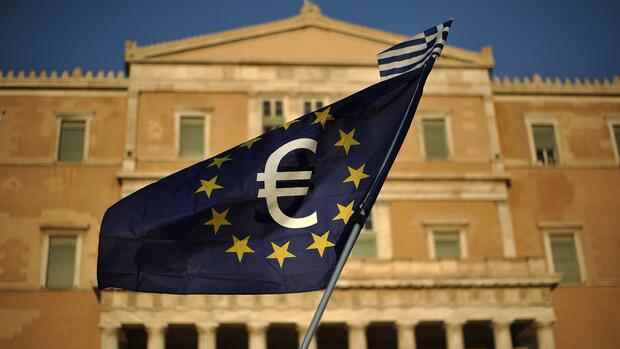Financing in Greece is increasingly bypassing banks.
(Photo: dpa)
Athens The consolidation of bank balance sheets in Greece is making good progress. At the end of the second quarter – more recent figures are not yet available – the banks reduced the rate of bad debts to 20.3 percent.
This is still the highest value in the euro zone, where the average is only 2.8 percent. But the progress is remarkable: in mid-2020 the rate was still 36.7 percent. At the height of the Greek sovereign debt crisis in 2015, even half of the loans granted were non-performing.
The financial institutions have so far survived the Covid recession without major wounds. The large wave of new loan defaults initially feared did not materialize. According to the latest estimates, claims of around five billion euros have become non-performing as a result of the pandemic. At the beginning of the year, there were still fears of losses of eight to ten billion.
With the cleanup of the balance sheets, the financial institutions will gain more leeway for granting new loans, which the Greek economy urgently needs. The government estimates that private investment will grow by 23 percent in 2022. But so far the banks have been reluctant to grant new loans.
Top jobs of the day
Find the best jobs now and
be notified by email.
In addition, because of the high interest rates in Greece, financing is more expensive than in almost any other country in the euro zone. The high cost of borrowing is holding back businesses, consumers and property buyers.
The Greek economy is structurally weak
The banks have ample liquidity at their disposal. The deposits rose in August to 173.14 billion euros. That was the highest level since 2014. Nevertheless, banks remain cautious when it comes to lending. According to calculations by the Euro Banking Authority SSM, the outstanding loans amounted to only 67 percent of the deposits in the second quarter. The average for the euro zone was 105 percent.
The reluctance of Greek banks to grant new loans is not only due to the still high levels of bad debts. Another reason is the structural weakness of the Greek economy.
99 percent of the companies have fewer than 250 employees, 95 percent even fewer than ten employees. In no other EU country is the proportion of small and medium-sized companies so high. Most of these companies are incapable of developing the business plans necessary for funding.
Greece’s prime minister expects private investment to grow by up to 23 percent in the new year – an ambitious goal that can only be achieved through favorable financing conditions.
(Photo: dpa)
With the support of the SSM, the Greek banks are now working on new procedures for credit checks and risk provisioning. In this way, the institutes want to prepare for the demands that will be placed on them with the EU Reconstruction Fund for Economic Recovery and Resilience (RRF).
Greece expects low-interest loans of EUR 12.7 billion from the fund. These are granted by the commercial banks and are to be topped up by around 30 percent with commercial bank loans.
Greece has the highest borrowing costs in the euro zone
But the high financing costs could prove to be a hurdle for the implementation of the development program. The bottom line is that lending rates in Greece are twice as high as the euro zone average. According to the European Central Bank, the Greek institutes charged an average of 2.77 percent interest on new mortgage loans in August 2021. That is the highest rate in the euro zone before Ireland with 2.76 percent.
For long-term corporate loans, the banks called in August 4.87 percent. Here, too, Greece once again has the highest borrowing costs in the euro zone after Latvia. In terms of short-term loans, Greece also leads the way with an average of 3.3 percent.
The banks make good money from the high interest rates. According to calculations by the SSM, in the second quarter the share of interest income in the income of the Greek banks was twice as high as the average of the European institutions.
At the same time, however, financing increasingly bypasses the banks. More and more large Greek companies are financing themselves through foreign banks because of the high borrowing costs or are going directly to the capital market with bonds. There you can get money much cheaper than at the banks.
In March, for example, the mineral oil company Motor Oil placed a bond for 200 million euros at a coupon of 1.9 percent. The shipping company Costamare took on 100 million for 2.7 percent in May. According to information from market circles, around ten Greek companies are currently preparing bond issues.
More: Fighting for Competitiveness: How Greece Wants to Promote Mergers.
